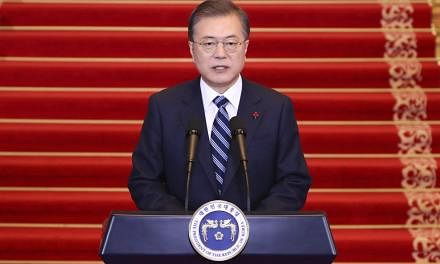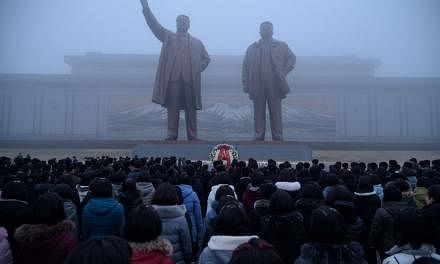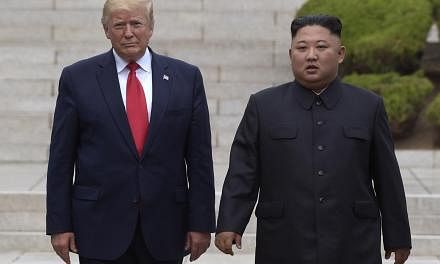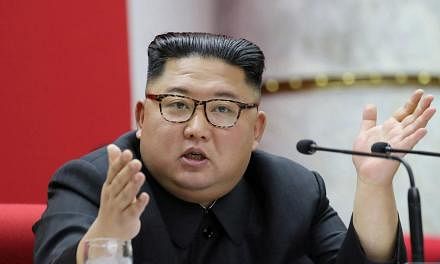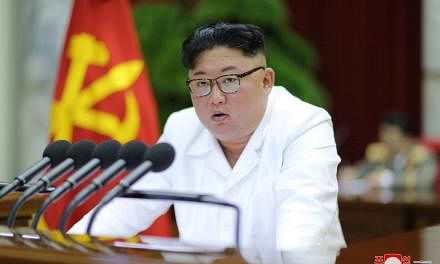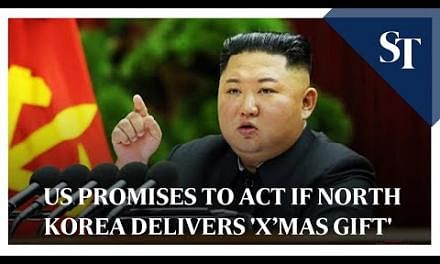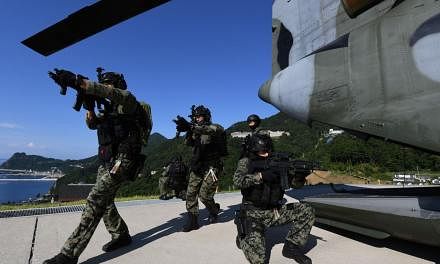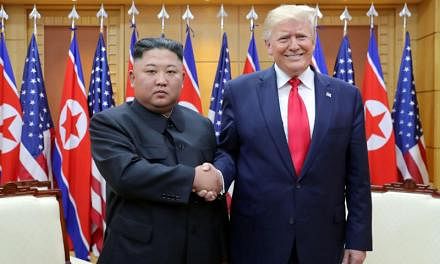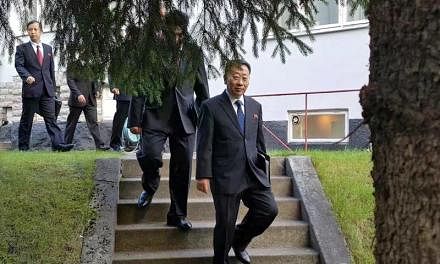SINGAPORE - When United States President Donald Trump arrived in Singapore on Sunday (June 10) for his summit with North Korean leader Kim Jong Un, he acknowledged that he was heading into "unknown territory".
The outcome after the landmark talks on Tuesday set down a marker for what looks like a long and demanding journey ahead to peace on the Korean peninsula.
Both leaders on Tuesday signed a document promising to work towards complete denuclearisation on the Korean peninsula. Washington also pledged to provide security guarantees for Pyongyang in return.
"Our whole relationship with North Korea and the Korean peninsula is going to a very much different situation than it has in the past," Mr Trump said after the signing ceremony.
What that new path will be is very much centred on whether North Korea's nuclear arsenal can be eliminated. And how that will be accomplished will be dependent on how negotiations work out.
Analysts noted that the onus on North Korea was lighter than expected. There was no mention of CVID or "complete verifiable, irreversible denuclearisation" that was part of the early US demands.
Moreover, Pyongyang was merely "committed to" working towards that goal, Mr Shawn Ho, an associate research fellow at the S. Rajaratnam School of International Studies, told The Straits Times.
"It would appear that North Korea has gained much more, especially in terms of reshaping its international image, from this summit than what the US has gained,'' he added.
There was no clear timeline or deadline either as to how that goal would be met. At this stage, all that is known is that US Secretary of State Mike Pompeo and North Korean officials would hold follow-up negotiations "at the earliest possible date".
What emerged on Tuesday from President Trump's press conference was a vague commitment by Mr Kim to destroy a "major" missile engine test site. There was no elaboration.
The document was mute on the signing of a peace treaty and on the state of international sanctions although Mr Trump told journalists later that they would remain in place for now.
While the US will not reduce American troop presence in South Korea, Mr Trump announced that it will halt the war games which North Korea opposes. "We will be stopping the war games which will save us a tremendous amount of money," he told reporters, adding that "at some point" he wanted to withdraw US troops from South Korea.
From the perspective of recent history, Singapore is a brief but key stop on the road to peace after the end of the Korean War in the 50s. As befits the mountainous terrain of the Korean peninsula, there are many more hills to climb, one of which would be assuring allies in the region of US defence commitments.
On the issue of denuclearisation, the attempts by successive US presidents to get Pyongyang to abandon its nuclear arsenal serve as a cautionary tale of setbacks and broken promises.
North Korea regards its nuclear arsenal as its "treasured sword" and it was never realistic that the US will get Mr Kim, who is Chairman of his country's State Affairs Commission, to sign off on an agreement for complete, verifiable and irreversible denuclearisation at one sitting.
Its nuclear programme began in earnest in the 1990s, after the collapse of the Soviet Union. In 1993, after the International Atomic Energy Agency (IAEA) found evidence that it was producing plutonium, then US President Bill Clinton sought to nip its nuclear weapons plans in the bud by negotiating a deal. The Agreed Framework in 1994 called for North Korea to agree to halt construction of its nuclear reactors in exchange for the US supplying it with oil shipments and building two new reactors that could not be altered to produce weapons-grade fuel.
Mr Kim's father, Mr Kim Jong Il, initially agreed to end his country's nuclear weapons and missile activities. But things fell apart following the discovery that Pyongyang was running a secret uranium enrichment programme.
After Mr Clinton, President George W. Bush had another go, this time by turning to North Korea's neighbours for help. The resulting "Six-Party Talks" involving the two Koreas, the US, China, Russia, and Japan led to a new deal, with North Korea promising in 2005 to "abandon nuclear weapons and existing nuclear programmes" in return for aid.
This time, Mr Bush insisted on strict verification measures, but North Korea continued to stall on implementing them, and in 2006, it conducted its first underground nuclear test.
After a new round of talks, in 2008, Pyongyang blew up the Yongbyon cooling tower in front of foreign media to show that it was serious in its denuclearisation efforts. The Bush administration eased sanctions but by year's end disagreements over procedures to verify disarmament led to Pyongyang banning nuclear inspectors. The next year, it conducted several missile tests along with its second nuclear test.
It is no wonder that by 2009, the then Defence Secretary Robert Gates said the US was "tired of buying the same horse twice" in its attempts to get the North Koreans to denuclearise.
How are things different this time?
The stakes are higher for all concerned. For the US and North Korea's neighbours, Pyongyang's technological advances on the nuclear front can no longer be ignored. Sceptics fear that Mr Kim is still sticking to the tested playbook of dragging negotiations along until he completes the final step in becoming a nuclear power: creating a warhead small enough to fit on an ICBM and sturdy enough to withstand re-entry into the atmosphere.
On Monday, South Korea's Deputy Prime Minister Kim Dong Yeon sounded a note of caution when he remarked that "just because a sparrow has flown in from the North, it doesn't mean that spring is necessarily here". But others like Professor Moon Chung In, a special adviser to South Korean President Moon Jae In, believe that Mr Kim has indeed broken with the past. "Don't use past behaviour as the yardstick for current behaviour," he said in a debate over whether North Korea can be trusted to denuclearise.
The optimists say Mr Kim is not like his reclusive father and stands to gain from his bold move to reach out to the US. In his early 30s, he can look to many more years in power and is under pressure to get sanctions lifted to improve the backward state of the North Korean economy. Limited market reforms he had undertaken domestically have also shown the benefits of greater liberalisation. Since he took power after his father's death in 2011, North Korea's GDP has risen 17 per cent and has seen the emergence of a fledgling urban middle class.
But North Korea would need more infusions of foreign investment, and this is where a thaw in ties with the US, South Korea and even Japan would help.
However, for these positive developments to happen, much more work needs to be done to flesh out what was signed on Tuesday. Dealing with the techical aspects of disarmament alone is a process that most observers agree would take many years. It will involve nettlesome issues such as the speed of the process of denuclearisation, what is put on the table as a quid pro quo and issues of verification.
While US national security adviser John Bolton's preferred "Libyan model" of having North Korea give up all its nuclear weaponry in a "big bang" process is a non-starter for Pyongyang, a phased "action for action" approach has had a record of failure.
Verification is also a huge and complex issue. Former US defence secretary Bill Perry and analysts like Stephen Herzog with Yale University have suggested that Pyongyang sign up to the Comprehensive Test Ban Treaty (CTBT) as a first step to show that it is serious about ending its nuclear tests rather than have the world rely on just pledges of intent.
Pyongyang could also take the further step of allowing CTBT inspectors to check that its dramatic demolition of test sites is not just for the cameras. Allowing experts from the IAEA to inspect its nuclear reactors would also be another positive move.
Mr Perry, who negotiated with North Korea during the Clinton administration, told Reuters on the eve of the talks: "I don't think it's a bad idea to start off with big concepts first and then work it down to the details."
Given the paucity of details, it is clear that many more rounds of hard negotiation will have to follow just to settle the question of what Pyongyang has to do to live up to its commitments.


